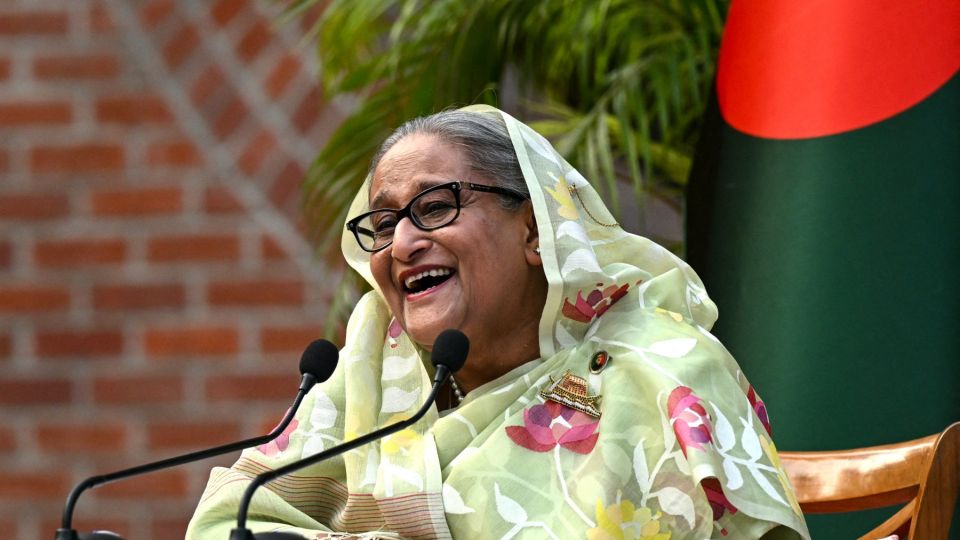July 10, 2025
DHAKA – Deposed prime minister Sheikh Hasina personally authorised the use of lethal force against student-led protests in Bangladesh last year, according to a verified audio recording of a phone call revealed by BBC Eye.
In the audio, which was leaked online in March and independently verified by the BBC, Hasina is heard instructing security forces to “use lethal weapons” against demonstrators, saying, “wherever they [the forces] find [protesters], they will shoot.”
The July 2024 uprising left at least 1,400 people dead, according to UN investigators. Hasina, who has since fled to India, and her party, the Awami League, have denied all allegations.
An Awami League spokesperson told the BBC the recording does not indicate any “unlawful intention” or “disproportionate response.”
However, the BBC reports that the leaked conversation between Hasina and an unidentified senior government official is the most substantial evidence to date linking her to the deadly crackdown.
The BBC World Service, in collaboration with BBC Bangla, had previously uncovered unreported details of a massacre in Dhaka, suggesting a much higher death toll than initially acknowledged.
A source familiar with the leaked recording said the phone call took place on July 18, with Hasina speaking from her Gono Bhaban residence. Police documents reviewed by the BBC show that military-grade rifles were deployed across Dhaka in the days following the call.
According to the BBC, the recording is one of several involving Hasina that were made by the National Telecommunications Monitoring Centre. The source of the leak remains unknown.
Since the protests, multiple recordings of her phone calls have circulated online, though many remain unverified.
The Criminal Investigation Department of Bangladesh Police confirmed the July 18 recording matched known audio samples of Hasina’s voice. The BBC also conducted its own forensic analysis, working with UK-based audio forensics firm Earshot, which found no signs of tampering or synthetic generation.
Earshot concluded the recording was likely captured with the call played on speakerphone, citing distinctive telephonic frequencies and consistent background noise. The presence of Electric Network Frequency — a byproduct of interference with mains-powered devices — further indicated the audio was genuine.
Analysis of Hasina’s speech patterns, including intonation, rhythm, and breath sounds, revealed no synthetic artefacts, according to the BBC.
“These recordings are critical for establishing her role. They are clear, properly authenticated, and supported by other evidence,” said Toby Cadman, British international human rights barrister and special adviser to the chief prosecutor of the International Criminal Tribunal.
An Awami League spokesperson told the BBC, “We cannot confirm whether the tape recording referenced by the BBC is authentic.”
Former government and police officials have also been implicated in the July killings.
BBC Eye analysed hundreds of videos, images, and documents detailing police attacks on demonstrators for over 36 days.
In one case in Dhaka’s Jatrabari area on 5 August, at least 52 people were killed by police fire, the BBC found. Initial reports at the time had reported 30 deaths.
The BBC’s investigation combined eyewitness videos, CCTV footage, and drone imagery to reconstruct the incident.
According to its report, police opened fire indiscriminately after army personnel, who had been separating protesters from police, withdrew from the scene.
For over 30 minutes, police fired at demonstrators attempting to flee through alleyways and nearby roads. Officers later retreated to an army camp. Protesters retaliated hours later, reportedly killing at least six officers and setting fire to the Jatrabari Police Station.
A Bangladesh Police spokesperson told the BBC that 60 officers had been arrested in connection with the July–August violence.
“There were regrettable incidents in which certain members of the then police force engaged in excessive use of force… Bangladesh Police has launched thorough and impartial investigations.”
Another Awami League spokesperson told the BBC, “The Awami League categorically denies and rejects claims that some of its senior leaders, including the prime minister herself, were personally responsible for or directed the use of lethal force against crowds.
“The decisions made by senior government officials were proportionate in nature, made in good faith, and intended to minimise the loss of life.”
The BBC said it approached the Bangladesh Army for comment but received no response.


